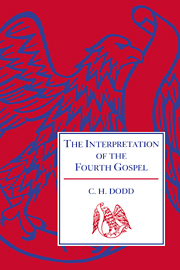APPENDIX: Some considerations upon the historical aspect of the Fourth Gospel
Published online by Cambridge University Press: 10 December 2009
Summary
It will have become clear that I regard the Fourth Gospel as being in its essential character a theological work, rather than a history. Nevertheless, the writer has chosen to set forth his theology under the literary form of a ‘Gospel’, a form created by Christianity for its own proper purposes. A gospel in this sense consists of a recital of the historical narrative of the sufferings, death and resurrection of Jesus Christ, prefaced by some account of His ministry in word and deed. To this type the Fourth Gospel entirely conforms, and in this it differs from all other contemporary literature which has the same aim—to set forth the knowledge of God which is eternal life. In one sense it might be said that in the Fourth Gospel the narrative is a dramatic presentation of theological ideas, for the incidents narrated, including, in one aspect, those of the Passion, are treated as ‘signs’ or symbols of unseen realities; and this symbolical character, as we have seen, goes very deeply into the whole scheme of the work. But this is not an entirely satisfactory description. In tracing the various lines of thought, and comparing them with analogous ideas in contemporary theology, we have time and time again been led to recognize the differentia of Johannine teaching in the fact that it finds the eternal reality conclusively revealed and embodied in an historical Person, who actually lived, worked, taught, suffered and died, with actual and direct historical consequences. The concise formula for this fact is 6 λóγō σρξ γγετō.
- Type
- Chapter
- Information
- The Interpretation of the Fourth Gospel , pp. 444 - 454Publisher: Cambridge University PressPrint publication year: 1953



